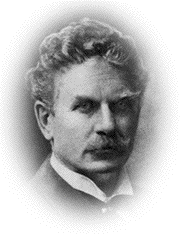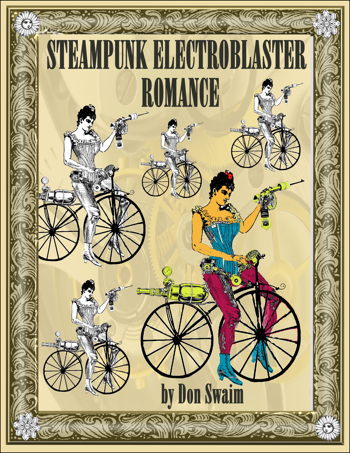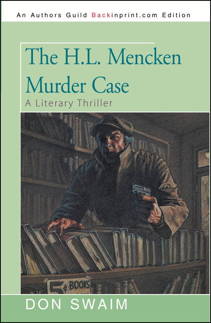The Ambrose Bierce Site
the AMBROSE BIERCE site
The Ambrose Bierce Site
the AMBROSE BIERCE site
Ambrose Bierce was born near the Ohio River, in Horse Cave Creek--a small Meigs County settlement in southeastern Ohio. Much of that hilly area is still wildly wooded, but in l842, when Bierce was born, it was only a generation or two away from the frontier. Decades later, he liked to claim that he was descended from "unwashed savages" . . . which was no more than flamboyant rhetoric, of course--the sort of scandalous posturing he enjoyed, like keeping his dead son's ashes in a cigar box on his desk. As for those old-time inhabitants of Meigs County: they were not savages at all, but among the finest people anywhere. Best known for his widely anthologized, unfortunately melodramatic short story "Occurrence at Owl Creek Bridge," along with a scattering of definitions from THE DEVIL'S DICTIONARY (e.g., "Bore: a person who talks when you wish him to listen"), Bierce's poetry has gotten little attention since he died under mysterious circumstances in Mexico covering the Pancho Villa uprising. 
To the extent that the art of poetry is the art of compression, Bierce is a master. The epigrammatic flair that helped make THE DEVIL'S DICTIONARY so famous can be felt and heard everywhere in his poems, many of which are very short, relentlessly articulate and pointed with an astringent wit:
The Gilded Age and its aftermath were a perfect milieu for a satirist possessed of a Swiftian saeva indignatio; and "Bitter Bierce," as he was known in his San Francisco days, must have loved the vulgarity and pomposities and silliness of his time. Indeed, one cannot conceive of his living in any other. How could he have survived without the political corruption and gaudy extravagance of late l9th Century America? How he would have missed the jingoism that inspired the following parody of MY COUNTRY 'TIS OF THEE, which has perhaps a greater claim than THE STAR SPANGLED BANNER to being our true national anthem, thus inspiring the pun in its title!
Like hot mustard, such verse tastes good even as it clears the sinuses. Although the poem's meanings are accessible in any generation, the full harmonics of its satiric coloration would have been most appreciated in the days of Boss Tweed (reflected in the "ring" reference, of course), Tammany Hall, and indeed some of Bierce's very own neighbors, the land pirates of San Francisco, the city in which this parody was first published.
The occasions for Bierce's wrath were often personal, for he had a gift for enmity, and loved to lampoon and pillory any living target that proved worthy . . . or un worthy, as the case may be. Proprinquity seemed to flavor the dish (to mix metaphorical sauces and touch up the culinary figure). He had no fear of power and authority; in fact, he seemed to take a special pleasure in stinging those so afflicted:
As for punning, here is that verse in which Bierce makes his views upon the subject clear . . . well, maybe not entirely clear --for the poem is a tangle of argumentation, requiring a close scrutiny of each developed figure.
My response to this poem is complex: as a dog lover, I take delight in that "cur without a wagger," and pat its head; as one who relishes logical puzzles, I savor the challenge of disentangling the arguments presented; but as a punster, I dissent . . . doing so, however, rejoicing as I growl, sharing Bierce's obvious pleasure in that triumphant, tripartite , knockout punch in the last stanza.
As for the poem's enigmas: they are enough to tease, fascinate and beguile the most zealous cryptophile. The figures in the beginning stanzas are especially baroque, far-fetched and fanciful. They are clear in themselves, but exactly how they can be said to relate to the subject of punning remains a puzzle. And yet, such opacity is not a mortal flaw, because soon Bierce's poem canters forth, marching doggedly out of that fog of inspissate mystification into high command, where all is lucid, bitter and lovely.
Like many who condemn and scorn the humble paronomastic, Bierce was probably a closet pun-lover . . . so that in this poem he was not confining himself strictly to anything like an innocent and earnest straightforwardness. Indeed, I would like to think of it this way, which is a plausible and interesting construction of the matter. And yet, if such is the case, and the poem is indeed meant ironically, everything in it is suddenly set upon its head, leaving readers scratching theirs.
Whatever the truth of that issue, the testimony of the poems already quoted is inescapable: here and throughout, Bierce's poetry is defiantly, unrepentently, jubilantly intellectual; and in spite of how solemnly he argues elsewhere (as in his short essay "Thought and Feeling" ) that feeling is the essence of poetry, while thought is adventitious, the testimony of his practice is otherwise--providing something analogous to the self-reflexive irony of Archibald Macleish's decree that "A poem should not mean but be," advanced in a poem that is presumably intended not only to be, but to mean what it says, in spite of what it says.
______________________
Bierce's great and commodious capacity for savage resentment was far from regional, much less parochial. To those with an appetite for injustice, the whole world is a banquet. And prominent among the viands in his day was Ireland and all that was Hibernian. In view of popular attitudes in late l9th century America, where signs stating that, "No Irish Need Apply" still flourished, the following has an especially bitter poignancy:
One of the side benefits of social satire is that it provides a vivid historical perspective into the evils, hypocrisies and confusions of an earlier time. In this way, Bierce's testimony makes us pause and reflect that for all our nether accomplishments, we of the 20th century cannot take all the credit for inventing wickedness, hypocrisy and terminal stupidity.
As a devoutly virulent scoffer, Bierce naturally tended to feel uncomfortable in sustaining the grand and majestic passions, and was not generally interested in packaging them. Few, therefore, are even hinted at in these pages. Instead, the reader must be willing to settle for precision, conciseness and the felicities of diction. And yet, like all good Victorians, Bierce was vulnerable to sentimentality, which, we are told in sophomore psychology classes, is often the affliction of cynics and misanthropes. He showed an instinct to adore and idealize women, for example, along with a capacity for idealism and loyalty and warmth in his friendships. His elegy to Ulysses S. Grant is characterized by a solemn and quiet eloquence; as is that in honor of his friend, William F. Smith:
__________________________
On January 29, l9l0, three years before his disappearance, he wrote to George Sterling, asserting that a young poet's proud father ("who is something in the mint at Philadelphia") had been afflicting him with the work. Bierce consistently disapproved of those poems until one came to him which impressed him so much he wore "out the paper and the patience of [his] friends by reading it at [sic ] them." That young poet was Ezra Pound, and the lyric that so pleased the old cynic was "The Ballad of the Goodly Fere."
At the beginning of this piece, I referred to Bierce's coming from Meigs County, Ohio, and mentioned his later sardonic reference to his descent from "unwashed savages." Then, in trying to put his comment in perspective, I argued that those people from southeastern Ohio in the l840s were among the finest anywhere. All of that is true, and I will not retract a single word. Nevertheless, as Bierce himself would be the first to point out, to say that any group of people are among the finest anywhere might not, after all, be saying much.
|
 |
 |
 click to buy |
